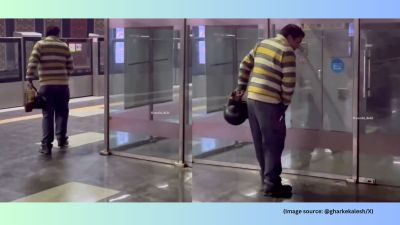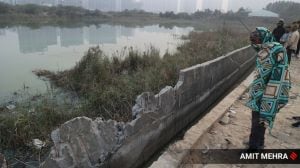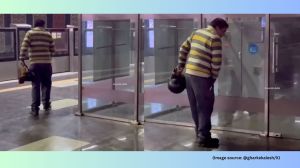The Educator8217;s Backyard
How is this for a delighted teenage refrain? 8216;8216;School is out because teacher is away!8217;8217; Or, more soberly, this? 8216;...

How is this for a delighted teenage refrain? 8216;8216;School is out because teacher is away!8217;8217; Or, more soberly, this? 8216;8216;There are teachers, but no building.8217;8217;
And when there are both buildings and teachers, the teachers have no salaries. Even when the stars are perfectly aligned and the paycheque comes in, the students, weary of the tedium and pointlessness of it all, drop out after class IV.
Not for them the lure of a university education and a job to follow. The IIMs don8217;t exist in their universe. It is another matter that the MP who represents this area happens to be Union Human Resources Development Minister Murli Manohar Joshi, he who rants against high IIM fees and preaches the virtues of 8216;8216;providing education with quality to all8217;8217;.
The Sunday Express visited 25 schools in Joshi8217;s Allahabad Lok Sabha constituency on February 19 and 20. The schools were chosen randomly, with just one simple criterion. We checked out schools closest to the highway or the main thoroughfares of the city, ones easily accesible to laypeople and government officials alike.
The findings outlined below are indicative but 8212; for reasons of space 8212; not exhaustive. These findings will bring no one much cheer. True, some schools were doing a competent job 8212; with parents keen to educate their children and teachers making the most of limited resources and difficult circumstances. It was also heartening to see more girls attending schools.
Dr Joshi, the MP, may argue that the condition of schools in his constituency is no better or worse than that of schools elsewhere.
But then Dr Joshi, the minister who swears by the Sarva Shiksha Abhiyan, should be very worried indeed.
The Great Bunching
Mayo Road Purv Madhyamik Vidyalaya
Teachers: Three
Students: 140
Wow factor: Just two good classrooms
The school takes in students from classes I to V. Do the math. It is simply not possible for each class to have its own space since only two classrooms, though dilapidated, are useable. So classes III, IV and V are bunched together while, in the other room, a teacher shouts at classes I and II, which also share space. 8216;8216;How can one complain when conditions are worse elsewhere?8217;8217; asks principal Kiran Saxena.
A slap here, a scolding there and some students do manage to come up with the right answers, even though it takes Pooja, a class IV student, a full two minutes to add 10 and 12.
The Big Ask
Bakhtiari Primary School
Students: 250
Teachers: Two temporarily one
Wow factor: Need you ask?
Aslam Mehmood drops by to say he will be away on election duty. This means the only other teacher in the school will now have to handle all five classes 8212; with their 250 students 8212; by himself.
Even with two teachers, the school seems to be struggling. It looks shabby and a sad stink envelops it. Asked how his colleague will cope, Mehmood spreads his hands and looks to the skies.
Food for Learning
Naya Katra Primary Girls8217; School
Teachers: Two
Students: 100
Wow factor: Principal bargains for attendance
Occasionally, the students did make their way to school 8212; not to learn but to avail of the annual scholarship of Rs 300 and to collect the three kg of cereals that each backward class child is entitled to. After that they would disappear to make bidis and earn some money.
Principal Premlatha Kushwaha has now driven a hard bargain. 8216;8216;I tell the parents, no money and no gehu-chawal wheat and rice unless their children attend regularly,8217;8217; she sighed. 8216;8216;It works.8217;8217;
The Vanishing Trick
Lala Ka Sarai Primary School
Purana Mumfordganj Primary School
Mehandali Primary School
Students: Too few
Teachers: Irrelevant
Wow factor: Every year, the fall by the wayside
Even as Uttar Pradesh claims to have reduced the number of out-of-school children from 43 lakh to just 2.1 lakh in a mere year, some schools insist they start losing students progressively from class II onward.
Let their numbers speak for themselves.
Class I: 42 students, Class II: 23, Class III: 11, Class IV: 8, Class V: 5
Class I: 18, Class II: 12, Class III: 10, Class IV: 9, Class V: 5
Class I: 29, Class II: 21, Class III: 12, Class IV: 11, Class V: 1
Back to nature
Students: Around 200
Teachers: Three
Wow factor: Classes under the trees
The building is a mess. For three years now, the teachers have been gathering their students under the trees and classes are at the mercy of the weather. When it is hot, the timings are advanced. When it rains, school is out. In course of our journey we discovered two other schools following the same method.
The Missing Teacher
Lakhnauti Primary School
Students: Unknown
Teachers: Untraceable
Wow factor: The padlock remains
Villagers say they haven8217;t seen the lone teacher for weeks. 8216;8216;He did come around Republic Day,8217;8217; said Kamleshwar, one of the locals. The door is locked though it is possible to peer inside and admire the two-inch thick layer of dust.
Kamleshwar does not blame the teacher though. 8216;8216;Poor guy,8217;8217; he says. 8216;8216;He does not have any means of transport.8217;8217;
Show me the Money
Kurigaon Public School
Students: 180
Teachers: Two
Wow factor: No salary for eight months
Last year, Ankit Singh got his entire year8217;s salary in a single instalment. So he has not lost hope, even though it has been eight months since he was last paid. Vijay Shankar Rao, who teaches at the neighbouring Gauhani Primary School is in a similar predicament. Perhaps, one day 8230;
The Good School
Garan Primary School
Students: 175
Teachers: Four
Wow factor: A man and his calling
Headmaster Gulab Prasad bicycles 20 km to reach school and still has the energy to innovate. He introduces class I students to words that are intrinsically part of their life in the countryside, words used by their farmer parents. Gulab Prasad is a thinking teacher, digresses from text books.
8216;It requires initiative, not funds8217;
The Sunday Express faxed questions on the state of primary education in his constituency to HRD Minister Murli Manohar Joshi8217;s office on March 12. Despite repeated reminders, there was no reply. Later, we spoke to Union Elementary Education Secretary S.C. Tripathi on the problems that were easily identifiable in Uttar Pradesh.
On high drop out rate
S.C. Tripathi: We need to take the parents into confidence. There should be much more interaction between teachers and parents. Even the problems faced by individual students should be taken up with the parents.
Teachers need to talk to parents to find out why their initial enthusiasm is being eroded. This is what teachers8217; retraining programme is for. One of the aspects of these programmes is to help teachers realise that such frequent discussions with parents will help them vary their teaching methods.
Often by talking to parents, teachers are able to get a fair idea of what has gone wrong. It could be that the non-availability of the mid-day meal scheme has upset both parents and students.
On poor infrastructure
We are aware that this area needs more financial support. But then, teachers are supposed to tell their classes what personal and public hygiene are all about. These toilets should not be in the shape they are.
We are aware that the states do not have separate funds for maintenance and that it will take time to build boundary walls. We cannot concentrate on boundary walls just now. We are more intent on reaching education to every child who is staying out of school.
Besides, maintenance of schools does not really require funds. It requires only a bit of initiative, a better communication between the teachers and the locals of the area.
On absenteeism among teachers
This suggests that the village committees need to be set up fast. Or if they are already in place, they must take much more interest than they are devoting right now.
If the local community does not take an active interest, you can never really keep a close watch on which teacher is really dedicated and who is not. It is the community that needs to take these responsibilities.
On a rational posting policy
I think this is a legacy that will only gradually be corrected. Earlier, you would find matriculates and graduates only in cities. So most teachers were from urban centres. As a result, you will find that a number of urban graduates are commuting daily to remote rural areas to teach.
We have to decentralise recruitment, as we are attempting to do under the Sarva Shiksha Abhiyan. And once we do so, these systemic blemishes will go away.
- 01
- 02
- 03
- 04
- 05































